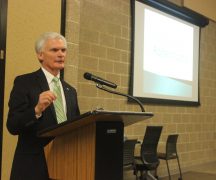By DAVID DUPONT
BG Independent News
Talking Wednesday with the outcome of the election was still unsettled, two political scientists were willing to make the call – Ohio is no longer a bellwether state.
Speaking over Zoom, Melissa Miller and David Jackson, both nationally recognized election experts on the Bowling Green State University faculty, said whether Donald Trump or Joe Biden wins, Ohio cannot be said to have mirrored the result.
Trump won the state garnering more than 53 percent of the vote. That’s a far different result than the national result which hinges on a few thousand votes in a handful of swing states, and a popular vote that has Biden ahead as of Thursday by 3.5 million votes, a margin that’s expected to grow.
“Ohio is no longer a swing state,” Jackson said.
With back-to-back lopsided wins, Miller said, “Ohio is looking less and less like a battleground state. … It’s really looking more and more like a red state.”
That’s seen in a place like Mahoning County which Hillary Clinton won in 2016 but flipped to Trump, 50-48 percent.
“There’s an impression of the Democratic Party as being too far left for your average Ohio voter,” she said. “I think Trump really played that up in terms of Biden being too far to the radical left which is ironic because he was a moderate among the Democrats.”
Biden argued against that in the debates. Stating his views were those of the Democratic Party. Still the GOP argument “resonates with folks who worry about Medicare for all,” Miller said.
There’s also, she said, “a hardening of the urban-rural divide in the state.”
“Trump connects in a unique way with those rural voters,” Jackson said.
Miller said exit polls showed Trump getting 72 percent of the rural vote while Biden got 62 percent of the urban vote, which was not enough to offset the GOP advantage in the country. Trump “squeaked by” with suburban voters.
Ohio does have a Democratic senator, Sherrod Brown, who easily won reelection in 2018, and Jennifer Brunner won a seat on the Ohio Supreme Court this year.
Miller said the question is whether this is truly “a new partisan profile or is it very Trump related?”
Will the Republicans in 2024 have the same result with someone else at the top of the ticket?
Jackson said that party identification lags behind changes in voting patterns. That won’t be obvious until the next round of primaries when people decide which party’s ballot to pull.
Still obviously in this election, he said, there are people who voted for progressive Democratic Congressman Tim Ryan, who represents the parts of Mahoning, Portage, Stark, Summit, and Trumbull counties, and for Trump. (Ryan is a BGSU graduate.)
Trump’s big win in Ohio also comes in the face of pollsters’ declaration that Ohio was a swing state with Trump having a less than a percentage point lead over Biden.
The polls, even more than in 2016, failed to anticipate the very close election.
FiveThirtyEight.com gave Trump a 10-percent chance of winning, which is, they noted, still a chance. In 2016, the site gave Trump a 30 percent chance of winning. Founder Nate Silver explained that its polls in 2016 were in the range of probability.
Miller said the failure of the polls “saddens me as a former pollster.” Also, both she and Jackson use survey data in their work.
Several factors are involved in pollsters getting the election so wrong, she said. “Fewer and fewer people want to take these polls. Everyone has a cell phone. They don’t have landlines. They screen their calls. It just becomes really, really impossible to get a sample prior to the election that will be representative of the actual electorate.”
Pollsters have used various weighting techniques, including extrapolating data if one category of voters is underrepresented.
That figured prominently in this year, Jackson said, when pollsters weighted their results for whites without college education. “That was supposed to be the silver bullet. It doesn’t appear to have been.”
He did note that the polls did a much better job predicting the popular vote. But then the state-level polling, which is more important given the Electoral College, are less reliable because of smaller sample sizes and often lesser quality polls.
Neither Jackson nor Miller hold any hope that the country will rid itself of the Electoral College.
That would require amending the Constitution, and that requires a two-thirds majority in both the House and the Senate, and then it would need to be ratified by two-thirds of the states.
Given the number of states who have an outsized impact because of the system, that’s highly unlikely to happen.
Jackson noted that the Republicans have only won the popular vote once since 1988 (George H. W. Bush v. Michael Dukakis), and that was in 2004 (George W. Bush v. John Kerry).
They also ruefully noted that of all the countries, such as the new democracies in Eastern Europe, that based their systems on the U.S. Constitution, none use the Electoral College.
“They left that one on the cutting room floor, and wisely so,” said Miller.
She said: “The Electoral College is here to stay, but it raises real questions about legitimacy. It has real implications for people’s trust in the process, trust in the government, the sense their vote counts. It’s not good for small ‘d’ democracy.”
The system is “problematic from a social perspective,” she said with the liberal coasts, with their concentration of population, “are held in check by the Midwest by the middle of the country.”
Still, she noted the electoral map seems to be shifting. As the 2020 election was still in flux, two southern states, Georgia and North Carolina, were among those where the vote counting was continuing and too close to call. Arizona and Nevada in the west were also still in play.
If Biden wins he’ll still be faced with a divided government. Miller noted he would be the rare instance of a presidential candidate coming into office without significant coattails – the Democrats appear unlikely to claim a majority in the Senate, and their House majority will be reduced.
He’ll have to work with Republican Senators Lisa Murkowski, Mitt Romney, and Susan Collins, who have shown some independence from Trump, Jackson said. “He’s going to have to do that stuff that can be passed without a filibuster.”
“That’s how he’s hardwired to govern,” Miller said of Biden. “You compromise, cut deals, and get passed what you can get passed. It’s a more incremental way of governing, and it unites both sides.”
If Trump triumphs, “the guard rails are off,” Miller said.
“With the divided House and Senate, he will be a little hamstrung as well, but he’ll do what he can through executive orders.”




